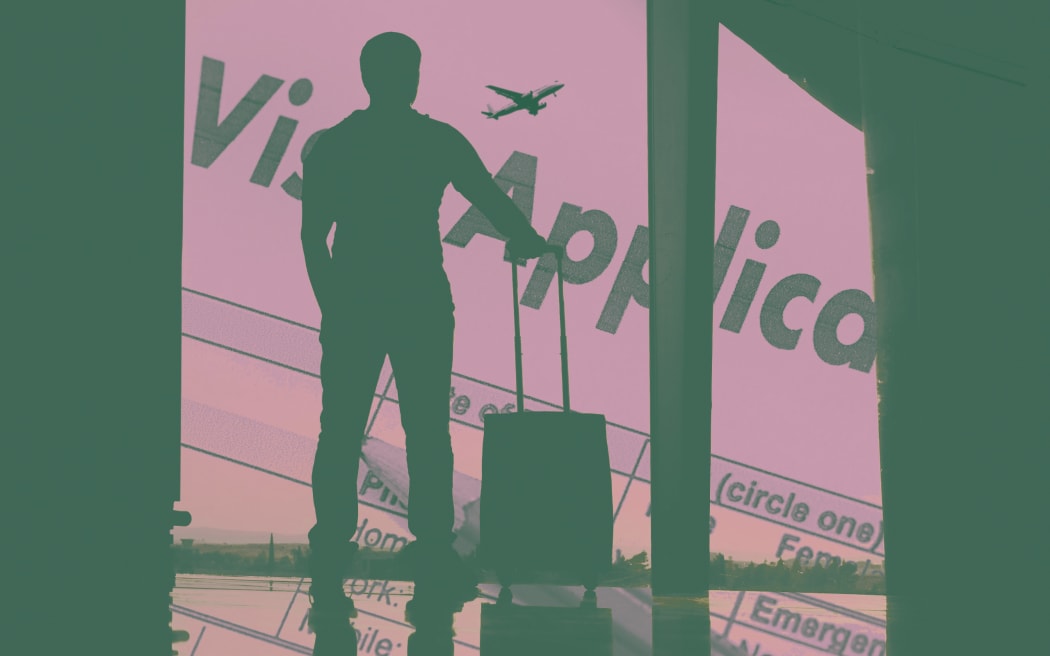
Photo: RNZ
- Board of Airline Representatives says rising visa fees could hurt New Zealand's tourism recovery.
- Visa fees will increase on 1 October.
- Ministry of Business, Innovation and Employment says the new rates won't significantly impact demand.
- BARNZ criticised MBIE for not consulting airlines, which they say hold crucial tourism data.
Rising visa fees could cement a decline in tourism too hard to bounce back from, the Board of Airline Representatives says.
Higher visa fees are set to take effect from 1 October - a move Immigration Minister Erica Stanford said would free up more than $563 million over four years.
A visitor visa would increase from $211 to $341, while the working holiday scheme would rise from $420 to $670.
Official documents showed that in March the Ministry of Business, Innovation and Employment (MBIE) met with key stakeholders to discuss raising the price of all visa categories.
However, Board of Airline Representatives (BARNZ) executive director Cath O'Brien said the consultation occurred confidentially and did not include input from airlines.
"The Cost Recovery Impact Statement notes that there isn't evidence of an impact on visitor demand. This is because they didn't seek the views of airlines and airports.
"We have firsthand data on the number of people coming into the country, and we could provide modelling of what impact this rise in visa costs could mean, but we weren't part of this consultation."
The increase in fees could affect the already softened demand for international visitors, she said.
"Planned air services for summer 2024 show just a 2 percent increase over summer 2023. New Zealand's tourism recovery has slowed almost to a standstill.
"Yet New Zealand is piling costs onto the same international visitors we claim we want to attract."
She also noted that the fees would reduce New Zealand's competitiveness as a destination for international students.
"I'd suggest young adults planning to visit New Zealand on working holiday schemes will look elsewhere when the cost of their visa is $670 NZD."
International Visitor Levy
In May, Tourism and Hospitality Minister Matt Doocey confirmed the government would consult on the International Visitor Levy (IVL); whether it should increase, by how much, and where it should be spent.
O'Brien said that with rising costs for visitors, students, and workers who wish to come to New Zealand, adding more cost in the form of a potential IVL increase should be taken off the table.
"A reduction in tourist arrivals will, in time, reduce air connectivity, which will reduce available cargo space to and from New Zealand."
She said the MBIE demand modelling completed for earlier proposals to increase the IVL showed that if the levy was increased to $100 per person, international visitor numbers would decrease 2.37 -2.61 percent, a loss of $144-$597 million a year for the economy.
"We cannot risk turning the stalling tourism market into a formal decline by endlessly increasing costs for those who wish to contribute to New Zealand's economy.
"If we do, we will cement a tourism decline that will take years to recover from."
New rates unlikely to impact demand
MBIE's manager immigration border and funding policy Stacey O'Dowd said they had consulted various groups over the fee changes including businesses, international education representatives, tourism organisations, migrant workers and immigration professionals.
She said the consultation also involved Tourism Industry Aotearoa "which represents the majority of tourism businesses, including airlines and airports."
O'Dowd said while feedback raised concerns about the effects on migrants and businesses, there was no strong evidence that higher visa prices would affect demand.
"No concrete evidence was provided by stakeholders that visa price increases alone would impact demand and MBIE's view remains that the new rates are unlikely to have a material impact on demand, as the visa costs are one component of costs associated with working, visiting, studying or moving to New Zealand."
When announcing the fees increases, Stanford said it would bring in more than $563 million over four years.
"The new charges reflect the costs associated with visa processing, assessing and managing more high-risk applications, and increased compliance costs as we deal with higher levels of migrant exploitation, managing more asylum claims, and maintaining and upgrading Immigration New Zealand's ICT systems," she said.






